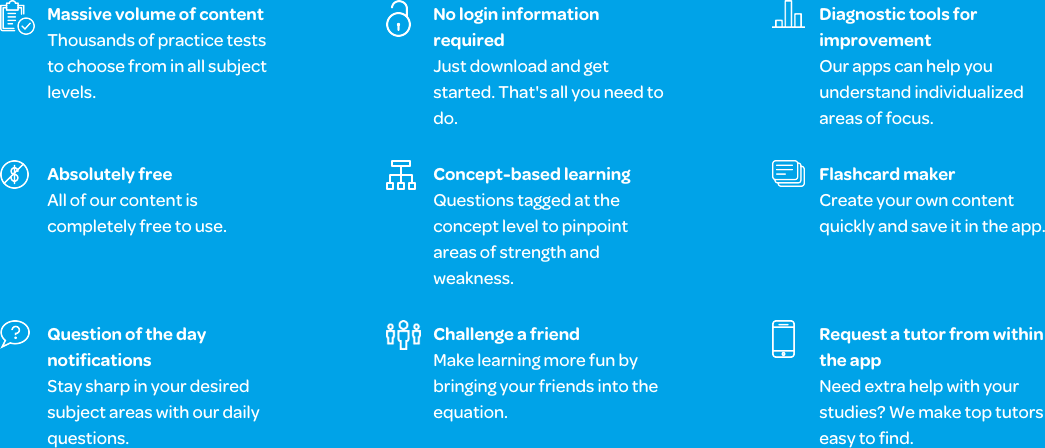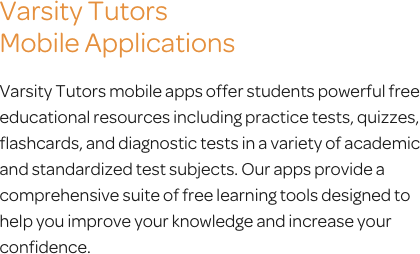The Varsity Tutors AP English Literature Mobile App
The AP English Literature exam requires you to understand many concepts. Passages will prompt you to infer the author’s intent or motive. Character-subject relationships are tested, as are the various ways syntax impacts the overall meaning of a piece of text. This three-hour test has 55 multiple-choice questions and three essay questions. The exam format can be challenging, but fortunately, the free Varsity Tutors AP English Literature app for Android, iPhone, and iPad allows you to practice identifying style in text, interpreting and describing tone, and understanding content.
Use Learn by Concept, hundreds of flashcards, and full-length practice tests available on the app to improve your working knowledge of analyzing the actions, motives, and goals of characters. The extra review may enable you to more accurately see the implications of ideas. One of the full-length or concept-specific practice tests available can help you assess your readiness for the AP English Literature exam by showing you the topics you should review.
Varsity Tutors offers study materials that are based on concepts that have been included on past AP English Literature exams. The questions and tests provide you with a clear, focused path, so there’s no guesswork as to whether you’re studying the right materials.
Your performance on the AP exam is one factor that will determine your college reading level. The flashcards, practice tests, and other tools available through the app provide engaging, relevant study materials. While you can read books to improve your comprehension, the app’s study materials will give you experience working with interpretations, metaphors, and inferences.
The skills you need to master require consistent practice. By working on the questions on the practice tests, you will become more familiar with the types of content on the test. Plus, you can continue taking full-length practice tests to track your progress as you continue with your study routine.
The materials found on the app have been covered on past exams. All of the materials have been written by professionals, as well. You’re given content that is relevant to your course and important to understand. The practice tests also provide the advantage of being timed, so you can assess your speed, in addition to your skill level, prior to the exam. You’ll have just 12 minutes to work on each passage during the actual test, so it’s important to focus on this area. You’ll also need to ensure you have adequate time to answer the essays in the free response section, where you’ll have to provide literary analyses. Proper time management can make it easier for you to analyze a poem, prose fiction, and the concept or issue in a literary work. Pre-planning where you will focus your time and effort is essential as you prepare for the exam.
The multiple-choice section of the exam gives you one hour to answer 55 questions based on excerpts of prose, drama, and poetry. There are several questions for each passage. Practicing with this format enables you to become more familiar with the concepts and how best to adapt your speed to complete the exam in the allotted time.
The Varsity Tutors AP English Literature app for Android, iPhone, and iPad is available on iTunes and the Google Play Store. It is an ideal AP prep tool, and can accommodate your busy lifestyle since you can take in the concepts whenever you have time. Studying has never been more convenient!
66 mobile apps to choose from for your tutoring needs.

Learn More
If you are a high school student interested in earning college credit for English, taking AP English might be for you. There are two separate AP English courses. One of these is AP English Language and Composition, which is meant for students who want to study writing analytical or persuasive essays that are not specifically about literary topics. AP English Literature and Composition is for students who want to study literature from many periods and genres in order to discuss literary topics.
Reading makes up a majority of the AP English Literature and Composition class. You will read widely, from many genres, time periods, and cultures. You will also read several works that you will get to know by reading thoroughly and deliberately, understanding their complexity, absorbing yourself in the richness of the meanings of the works, and analyzing how that meaning is embodied through the literary form. You’ll also look closely at the social and historical implications of the works that you read. Your attention will be called to both the details in the text and the historical context, so that you can properly analyze a work.
You will experience literature by reading and responding to various works. These can be novels, short fiction, poetry, or drama. You’ll interpret works by analyzing them using close reading so as to understand their multiple meanings. Finally, you will evaluate the quality and artistic achievement of the works and consider their social and cultural value.
If you are taking AP Literature, you are expected to be able to handle mature pieces of literature, which sometimes contain controversial issues. The way to respond to such incidents or details is to question the larger meaning, the purpose, or the overall effect of it in context. This thoughtfulness separates your learning from those of lower-level high school English courses.
Writing is involved in the “Composition” part of the class. Assignments that focus on the critical analysis of literature include expository, argumentative, and analytical essays. In addition, you may have opportunities for creative writing of your own to explore how literature is created. Through writing, you will increase your ability to explain cogently, clearly, and even elegantly, what you understand about particular literary works and why you see them the way you do.
When writing, you will learn the elements of style, including precision and correctness. Your goal will be stylistic maturity, which means using a wide vocabulary with accuracy in denotation and connotation; using a variety of sentence structures; organizing your writing logically using techniques such as transitions, repetition, and emphasis; balancing generalization with specific details to illustrate your point; and using rhetoric effectively, including maintaining a consistent voice, controlling tone, and properly using emphasis through antithesis and parallelism. The writing is intended to reinforce the reading you have done.
At the end of the AP English Literature and Composition course, you will take the AP exam. Your score will be from 1-5. The scores are meant to determine how qualified you are to receive college credit or placement. A 5 indicates that you are well qualified, and a 1 means there is no recommendation.
The test itself includes two sections. The first section is multiple choice, takes one hour to finish, and has 55 questions which make up 45% of your exam score. Section two includes three free-response questions, takes up to two hours to complete, and constitutes 55% of your exam score. The three free-response questions include a literary analysis of a poem provided on the exam, a literary analysis of a passage of prose fiction provided on the exam, and an analysis that examines a specific issue, concept, or element in a literary work selected by you. One sample of a free-response question that has previously been given provides a 16th-century poem and asks you to “write an essay in which you analyze how the complex attitude of the speaker is developed through such devices as form, diction, and imagery.”
The multiple choice section includes questions on interpreting passages and interpreting words and excerpts (all provided on the test). You will be asked to read a specific passage and then extrapolate information from that passage. You may be asked to make inferences based on the text, which could be on author’s intent or on the details of the passage itself, such as character traits. You are also likely to be asked to distinguish implied ideas, which are not directly stated in the text but are made obvious by what is in the text. You will also likely answer questions regarding the author’s opinions and bias, which are always present, though not always easy to distinguish. Summarizing or describing the passage will be required as well in the multiple-choice section.
You will also be asked questions on the passage content, such as character and subject relationships, claims and arguments, and comparisons and contrasts. You will also be asked to deduce the motives, goals, and actions of the characters in some passages. You might run across some two-blank type questions asking about specific literary devices and their purposes, or be asked to define certain terms, possibly outdated, through the context of the passage.
Interpreting excerpts is an important part of the exam. You will be asked to interpret the connotation and implication of excerpts in context, as well as the meaning and purpose. Some questions will focus on summarizing, describing, or paraphrasing excerpts, and some will ask you about the syntax and structure of the excerpts. Some of the more detailed questions you might face involve describing how imagery is used as a metaphor in an excerpt, why a certain action was taken by a character in an excerpt, or how a character acts in relation to an action taken by another character.
Finally, the test will ask you to interpret words, including their connotation and implication. You’ll need to describe the relationship between words, understand why the author chose specific words, and what effect they wanted to induce with that choice, including the word meaning in context.




